GlobalWA Members Develop Mobile Health Software to Improve Access to Healthcare Information in Developing Countries
Posted on April 22, 2014.
By Gena Lux
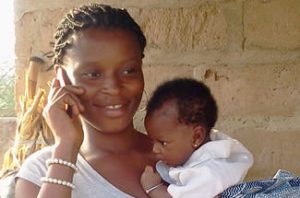
Photo Credit: Grameen Foundation
“I have no idea how I’d manage without it” is a sentiment often heard when speaking of our connection to handheld devices. Our smartphones tell us when to get out of bed in the morning, keep us connected with friends and family, help us navigate directions, and now have the ability to provide us with round-the-clock health advice from medical professionals.
One Global Washington member, Grameen Foundation, along with several other mobile health (mHealth) implementers, and core sponsor Bill & Melinda Gates Foundation, another valued member of Global Washington, are tackling a project to help people living in the developing world have similar access to healthcare information.
The Mobile Technology for Community Health (MOTECH) Suite is a software project that allows mHealth solution-based partnerships to develop and manage health resources in a cost-effective and user-friendly manner resulting in better health outcomes.
Continue Reading
Awareness Campaigns the Focus of GlobalWA’s April Executive Director Roundtable
Posted on April 16, 2014.
By Kelly Gibbs
Running an effective awareness campaign was the topic at last week’s Global Washington Executive Director Roundtable. Jennifer Norling, Director of Development and Communications for Seattle-based Water 1st, was the presenter. She was speaking to the group in the aftermath of the organization’s successful World Water Day campaign that took place in March.
Water 1st chose to use Facebook to launch its World Water Day campaign. It asked its followers on the social media site to post self-portraits or “selfies” of themselves holding a piece of paper with the message “Because I don’t have to carry water 5 hours a day, I can” and asked them to fill in the blank. In the end, 200 people posted pictures and re-shared their messages in less than 24 hours. If you were using social media on March 22, I’m almost certain that you saw someone you know holding up their sign!
Continue Reading
April 2014 Newsletter
Posted on April 15, 2014.
Welcome to the April 2014 issue of the Global Washington newsletter. If you would like to contact us directly, please email us.
IN THIS ISSUE
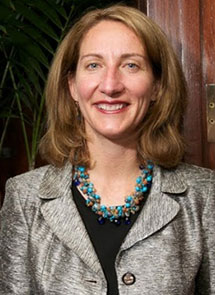 “Who else can bring together NGOs, companies, philanthropists, and universities to have meaningful conversations about development?”
“Who else can bring together NGOs, companies, philanthropists, and universities to have meaningful conversations about development?”
“I met someone from a major corporation at the Global Washington conference, we had several meetings over the past year, and we’re now partnering on a project.”
“If it wasn’t for Global Washington, I wouldn’t know where to start when it comes to new ways to promote my organization. Twitter, Facebook…I didn’t know anything about social media!”
The above is a sampling of comments I’ve heard over the past few weeks about the unique value that Global Washington offers its members. I have to say that I was skeptical that a broad-based membership association could still be relevant and provide fresh programs after five years in existence. But, the excitement, endorsement, and potential for Global Washington’s future is very evident to me now.
The GlobalWA staff and board are undertaking an intensive, 8-week strategy refresh to evaluate the success of the past five years and build out a plan for the next five. We intend to develop a clear value proposition and a road map to reach our goals through meaningful offerings to our members. The overall vision to strengthen and promote those working in international development remains our central priority. We believe that a vibrant, innovative sector in our state will ultimately help to create a better world, both locally and abroad. Stay tuned for more on this over the next few months.
In the meantime, I encourage you to take advantage of our upcoming events. In addition to our monthly Executive Director Roundtable and monthly Happy Hour, we have two remarkable events in May. Howard Behar, former President of Starbucks International, will share insights on May 14 about the art of management—a topic relevant for business and non-profit alike. On May 30, we are honoring our members at our Spring Member Celebration to recognize the meaningful work you all do every day. Please join us!
This month, our newsletter highlights some of the work our members are doing in India. Next month, we’ll focus on Africa. I hope you will read these stories each month with pride in your own organization and in those who are working beside you, here in Washington State and around the world.
This is an exciting time for Global Washington and its members. I look forward to meeting all of you at one of our upcoming events!
Sincerely,

Kristen Dailey, Interim Executive Director
Back to Top

Does your organization have a staff member or partner from another country who will be visiting Seattle this year?
Please click here to respond.
Back to Top
India in the News
India’s “Corporate Social Responsibility” Mandate Now in Effect
By Holly Koch
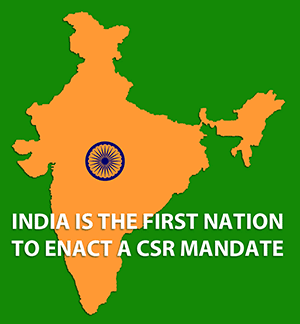 April 1 marked the official beginning of a first-of-its-kind component of India’s update to its 1956 Companies Act: a mandate that companies that have more than $830,000 in net profits are required to spend 2 percent of those profits on so-called “corporate social responsibility (CSR)” projects.
April 1 marked the official beginning of a first-of-its-kind component of India’s update to its 1956 Companies Act: a mandate that companies that have more than $830,000 in net profits are required to spend 2 percent of those profits on so-called “corporate social responsibility (CSR)” projects.
“These guidelines would be applicable to close to 8,000 companies,” said Sunitha Viswanathan, an associate at Unitus Seed Fund in Bangalore, India. Unitus is a Global Washington member.
What does this mean for development in India? According to Viswanathan, the mandate could result between $2-2.5 billion being set aside for CSR in the first year. “There are more than 400 million people in India who live on less than a dollar a day,” she said. “The current requirement to reduce this disparity is huge and the first year’s spend of $2.5 billion will not be able to cover for this.”
The goal, however, is not to solve India’s poverty struggles in the first year. “The idea is that the corporations are going to increase their net profits, which will ultimately lead to five years down the line, the amount may be $10 billion or $15 billion, and that’s something that’s going to significantly help all of the NGOs (non-governmental organizations) and the social enterprises,” said Viswanathan.
While the 2 percent CSR spend is a mandate, there are no official penalties for failing to comply. Companies are simply required to explain their lack of spending in their annual report. While this has many people worried, Viswanathan believes the social repercussions are enough to keep most companies in line. “This is not something that would be perceived very well in the market. It sends out an entirely negative signal in terms of corporate governance.”
Others, according to Viswanathan, worry “that a lot of corporates might just window dress and start accounting for things that are not really a CSR spend.” Some believe this type of green washing could be, in part, aided by the mandate’s vague description of CSR.
However, Viswanathan said the most pervasive worry in India surrounding the mandate is the potential inadequacy of many of India’s NGOs to properly scale up their operations. “A lot of NGOs are not run as professionally as most of these corporations would want them to be.”
The bridge that is being built between businesses and NGOs is vital. Not only do development challenges require funding, they also require effective programming. The partnerships forming in the wake of the CSR mandate are providing NGOs and social enterprises “the chance to tap into the brains of some of the most intelligent folks right now, which they probably didn’t have before,” said Viswanathan.
Because companies will share in both the successes and failures of the organizations they support, Viswanathan believes the relationship will greatly improve their efficacy. “This will actually necessitate a lot of discipline, making them a lot more stringent, and hold the NGOs accountable because corporates are not going to let them off the hook that easily.”
While it’s likely that India’s CSR mandate will see struggles in its first year, the potential rewards of its success will have a powerful effect on development in India, effects that may possibly motivate other nations to adopt similar requirements.
“I think when you bring about something as different as this, there’s going to be a lot of backlash, there will be hurdles and roadblocks as you go ahead, but there had to be a starting point and this is probably a good way to start,” said Viswanathan.
Back to Top
India Elections 2014: World’s Largest Democracy Goes to the Polls
By Dean Forbes
The world’s largest democratic elections are taking place for five weeks in India, ending on May 12. An estimated 814.5 million Indians – and for the first time, nonresident Indians – are eligible to vote to choose the representatives to India’s lower house of Parliament, the Lok Sabha. The composition of that body determines which party chooses the prime minister and governs the country for the next five years. According to Election Commission of India officials, 65 percent of India’s population is expected to vote, while 20 percent of eligible voters will have the ability for the first time.
Voting is taking place by region. According to an election primer in The New York Times, the Election Commission of India has mobilized more than 10 million polling officials and security personnel to carry out the election. There will be about 930,000 polling stations. Voting is staggered and will be done in nine phases from April 7 to May 12. Voting will be done by electronic ballot. The results are scheduled to be announced on May 16.
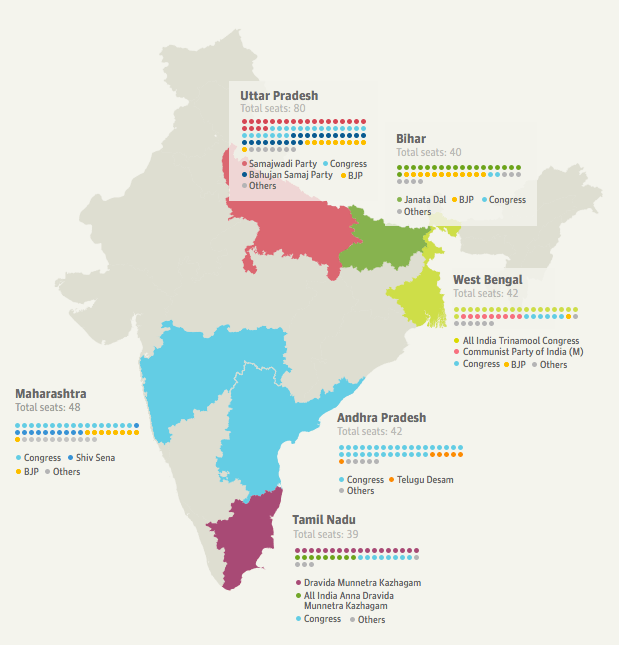
Photo Credit: The Guardian
The race is ultimately between Narenda Modi of the Bharatiya Janata Party (BJP), Rahul Gandhi of the INC (Indian National Congress), and Arvind Kejriwal of the Aam Padmi Party (AAP). The INC’s historic political hold is now in question as “debate among analysts in Delhi largely centers on the margin of the BJP victory, not on its likelihood,” according to the The Guardian newspaper.
Following is background about the election from a primer published in the New York Times:
The major parties
India has a multiparty system with more than 50 regional parties and two major national parties, the Indian National Congress, which leads the governing coalition, and the opposition Bharatiya Janata Party. The Congress party, which was formed in 1885, when India was still under British rule, has dominated Indian politics. The party played a leading role in the struggle against colonial rule, giving rise to some of the most prominent national leaders, including Mahatma Gandhi and Jawaharlal Nehru, who went on to become the first prime minister of India. The Bharatiya Janata Party, the other leading national party, is the main opposition in the Lok Sabha. Its roots are in the Hindu nationalist organizations. Modi is a member of one such organization, the Rashtriya Swayamsevak Sangh, and a self-described Hindu nationalist. The Aam Aadmi Party, or the Common Man Party, was born out of mass street protests against corruption that erupted in 2010 and 2011. Its leader is a retired civil servant named Arvind Kejriwal. The party surprised political analysts by winning 28 seats in the Delhi state elections, enough to seat Mr. Kejriwal as chief minister. But Mr. Kejriwal resigned just 49 days into his term, accusing the two main parties of failing to support an anticorruption bill.
How the government is formed and prime minister chosen:
The party that wins the greatest number of seats usually forms the government and chooses the prime minister. Getting a majority, or 272 seats, usually requires building a coalition with smaller parties. India’s multiparty democracy allows for the formation of alliances between political parties. Since the mid-1990s, coalition governments have been the norm as no party has been able to secure a majority on its own. Alliances are fluid and can change any time after the elections.
Some of the key issues:
Corruption. A slew of corruption scandals involving the Congress-led government, and an anticorruption push by the Aam Aadmi Party have left an impression on voters.
Economy. Slowing growth, persistent unemployment and high food prices have led to disenchantment with the present government.
Secularism. The ascent of Modi and his Hindu nationalist party has raised concerns that members of minority religious groups would face discrimination if the Bharatiya Janata Party comes to power.
Back to Top
Featured Organization
Splash
By Holly Koch
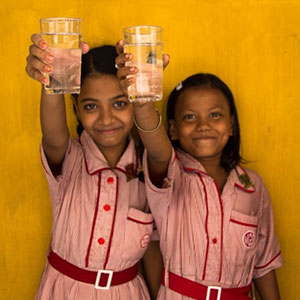
Photo Credit: Splash, Murlidhar Girls School in Kolkata, India
On Seattle’s Capitol Hill, nestled between two colorful storefronts, is the door to Splash. Behind it is a staff with an unwavering dedication to the role clean water plays in the health and education of children in the developing world. “We know what clean water means for them,” explained Director of Strategy Peter Drury. “Healthier lives, more school, greater economic opportunity, and as adults, they’re going to demand clean water in the future.”
From its early beginnings as a manifesto on the pages of Founder and Director Eric Stowe’s notebook, Global Washington member Splash has become a formidable force behind clean water projects in some of the most impoverished regions in the world.
For example, Splash began working in China in 2007 with a focus on its more than 1,000 orphanages in 31 provinces. “By the end of this year,” said Drury, “we’re going to have secured clean water in every orphanage in China.”
To reach efficacy at such scale requires an austere examination of the practices within global development. “A great deal of international development work is focused on an initial gift, an act of seeming benevolence,” explained Stowe, “and then post-implementation there’s really this quick reduction of services for these same communities which often results in failed projects.”
With sustainable solutions as its objective, Splash commits a minimum of 10 years to its water projects, a guarantee comprising the hiring and creation of local teams, as well as all ensuring ease for spare parts, peripherals, water quality tests, service, and maintenance of its equipment, according to Stowe.
The quality of water is dependent upon Splash’s filtration systems, the same ones that global food-chains like McDonald’s use, which target biological contaminants. According to Stowe, the likelihood of the smallest bacteria (approximately .2 microns) getting through the .015 micron filter is akin to a basketball’s ability to penetrate a straw.
 To ensure the continued quality of water to both the affected communities and to donors, in-country staff go to these sites every three months for the first two years, and every six months thereafter, according to Stowe. Reports on the projects they conduct are published on Splash’s online system for accountability, Proving It. This includes – and calls out transparently – the ones that fail.
To ensure the continued quality of water to both the affected communities and to donors, in-country staff go to these sites every three months for the first two years, and every six months thereafter, according to Stowe. Reports on the projects they conduct are published on Splash’s online system for accountability, Proving It. This includes – and calls out transparently – the ones that fail.
“This transparency is meant to ‘lift the firewall’ between the organization and its donors,” said Stowe. “Every project we’ll ever undertake is going to fail at some point. It’s how you respond in the wake of that failure that makes the difference.”
Stowe’s devotion to transparency includes the sincerest form of flattery: the imitation and replication of successful strategies employed by other organizations in both the nonprofit and private sectors. At Splash, they ask themselves, “Is there a way that we can analyze how they’ve done what they’ve done, how they’ve scaled, how they’ve hired, how they’ve accredited, whatever the case may be, and adopt their practices accordingly?”
Splash recently launched operations in India, where the obstacles required the organization’s “look for the best; learn from the best” model. Where the Splash model in China benefits from Beijing’s unequivocal authority in determining ubiquitous national regulation, in India “every single state, and within those states, the regions, districts and cities, are acting so differently from what the national standards are,” said Stowe. “We don’t view it as one monolith; we view it as multiple types of development engagement, and are positioned to customize accordingly while still preserving the ability to scale.”
After analyzing the social and cultural landscape of India, Splash determined its proof point would be in Kolkata, India’s third largest city, and that the most urgent – yet solvable – need was within public schools. “In terms of numbers of children, in Kolkata alone, we’ll be in 2,000 schools serving half a million poor kids. Just think about that,” said Drury.
 “In India, the goal is to recalibrate what the national quality standard is, and to eventually leverage Splash’s work in India as the model,” said Stowe. Splash has identified that the amount of funding by the Indian government toward similar projects is comparable to the needs of establishing the organization’s model at scale, an extremely promising fact.
“In India, the goal is to recalibrate what the national quality standard is, and to eventually leverage Splash’s work in India as the model,” said Stowe. Splash has identified that the amount of funding by the Indian government toward similar projects is comparable to the needs of establishing the organization’s model at scale, an extremely promising fact.
As Stowe explained, the process of transforming water “from insanely nasty to incredibly safe” is the most straightforward of their tasks. It is governmental buy-in that will make or break a program’s longevity.
Combined with the “incredible chessboard” that is navigating behavior change, governmental advocacy, community mobilization, and the relationship building with staff and neighborhoods, Splash’s mission of achieving 100 percent coverage in its India program is nothing short of ambitious.
As Drury puts it, however, “We’re just getting started.”
Back to Top
Changemaker
Sachi Shenoy, Executive Director and Co-Founder, Upaya Social Ventures
By Gena Lux
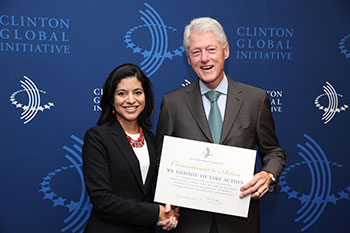 It’s an oft-heard story: A young couple emigrates from India to the United States with aspirations of higher education and a better future for their children.
It’s an oft-heard story: A young couple emigrates from India to the United States with aspirations of higher education and a better future for their children.
“Both of my parents were the first in their families to leave India,” said Sachi Shenoy, Executive Director and Co-Founder of GlobalWA member Upaya Social Ventures in Seattle. “My aunts, uncles, cousins all remained in India when I was a child.” Shenoy was born a U.S. citizen in New York and soon her father moved their young family to Houston, Texas to start a cardiology practice. “We spent our summer vacations in India.”
Shenoy realized from an early age that her life in America was vastly different from those of her relatives in India. She grew up in an affluent household while her relatives lived more modestly. As witness to her father’s tenacity toward education and work, Shenoy knew that whatever path she took in her life, she wanted to be in a position to provide for those less fortunate in India as her father’s medical profession had allowed him to do for many years.
Shenoy received her bachelor’s degree in economics from the University of Chicago and later earned an MBA in finance and entrepreneurship from her alma mater. While a student, Shenoy interned on Wall Street, gaining valuable experience in the world of finance. Upon graduation, Shenoy dove into financial services full-time and spent nearly a decade on Wall Street working in sales and trading and management consulting.
While completing her MBA, Shenoy also interned with SKS Microfinance, a non-banking financial company with a mission to eradicate poverty in India by providing financial services to the poor. While there she authored a business plan for the SKS Ultra Poor Program. Several years later, Shenoy moved to India fulltime for about a year to act as SKS Microfinance area manager. Upon returning to the U. S. in late 2007, Shenoy worked for the non-profit Unitus for three years as its Director of Global Programs. She continued to hone her craft working to alleviate poverty by overseeing Unitus’s Ultra Poor Initiative and Social Performance Management projects.
During the course of the Ultra Poor Initiative, Shenoy oversaw six different pilot programs that all aimed to reach and serve the poorest of the poor. She observed that the interventions that employed the poor – versus the ones that simply gave them food and healthcare subsidies – resulted in a faster and more sustainable improvement in their clients’ lives. “What the poor – even the poorest of the poor – need most is a ‘hand-up’ and not a ‘handout’,” Shenoy said.
This experience prompted Shenoy to co-found and serve as the Executive Director of Upaya Social Ventures, which she calls her “dream job.” The mission of Upaya is to create businesses that will generate jobs and raise communities out of extreme poverty. Upaya creates jobs by working alongside start-up enterprises, as well as consults with established organizations, aimed at alleviating disparities facing the ultra poor in regions throughout India. To date, Upaya has helped to build six businesses that have collectively created over 1,100 jobs.
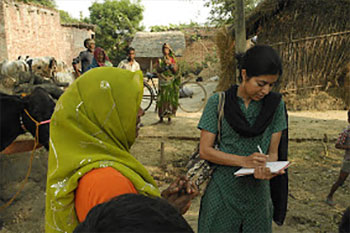 Shenoy speaks with fervor about Upaya’s entrepreneurs and proudly displays the finished products from one of their ventures: dishware made out of dried leaves that come from areca palm trees, found in abundance in the state of Assam in northeast India. Upaya’s financial and technical support helped a local Assamese entrepreneur build a number of production units, complete with machines that produce leaf plates in different shapes and sizes. These small factories have created hundreds of jobs for the ultra poor in the state of Assam.
Shenoy speaks with fervor about Upaya’s entrepreneurs and proudly displays the finished products from one of their ventures: dishware made out of dried leaves that come from areca palm trees, found in abundance in the state of Assam in northeast India. Upaya’s financial and technical support helped a local Assamese entrepreneur build a number of production units, complete with machines that produce leaf plates in different shapes and sizes. These small factories have created hundreds of jobs for the ultra poor in the state of Assam.
Shenoy and her team intend to see many more people living in severe poverty find steady employment as Upaya makes more connections with entrepreneurs and businesses throughout India.
Shenoy offers three valuable pieces of advice to recent graduates who want to focus on global outreach initiatives:
Gain corporate experience. Shenoy recommends recent college grads learn the soft skills on how to manage a business by actually working at one. She credits the experience and mentorship she gained from working at JP Morgan and PricewaterhouseCoopers as “critical” to her success as an entrepreneur.
Be familiar with business fundamentals such as accounting and finance. She recommends taking these classes while still in school or auditing a class at the University of Washington in order to understand the basic building blocks of business.
Know what you are advocating for, “immerse yourself in a region, know the culture, and know the language.”
Shenoy’s commitment and devotion to her work is palpable. “I hope to be doing this for the rest of my life,” she says about her work at Upaya.
To find out more about Upaya’s work throughout regions of India, and how you can help, visit Upaya Social Ventures.
Back to Top
Member Recognition
Mobility Outreach International: POF Celebrates a Silver Anniversary and New Name
By Holly Koch
 Global Washington member Prosthetics Outreach Foundation celebrated 25 years of life-changing work – giving the gift of mobility in the developing world – at its March gala, and it used the occasion to announce the organization’s new name: Mobility Outreach International (MOi).
Global Washington member Prosthetics Outreach Foundation celebrated 25 years of life-changing work – giving the gift of mobility in the developing world – at its March gala, and it used the occasion to announce the organization’s new name: Mobility Outreach International (MOi).
Originally focused on providing services in Vietnam, MOi has grown geographically to include Bangladesh, Sierra Leone and Haiti. It has also seen substantial growth in its scope of services, the main impetus for its rebranding. However, “While we changed our name and our look,” said Executive Director Marion McGowan, “our core mission is the same.”
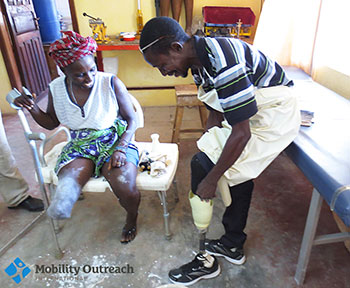 As a U.S. Army surgeon during World War II, MOi founder Dr. Ernest M. Burgess witnessed the devastating effects amputees face due to immobility. A prominent Seattle-based orthopedic surgeon, Dr. Burgess began the organization as a way to improve lives, as well as U.S.-Vietnam relations. In addition to providing physical rehabilitation services and orthopedic surgery outreach, more recently, MOi has grown to include a substantial clubfoot program, addressing a debilitating deformity annually afflicting one in 1,000 newborns. “It is life-changing,” said McGowan. “When you help that one individual regain their mobility, it creates a ripple effect that helps the family and the community.”
As a U.S. Army surgeon during World War II, MOi founder Dr. Ernest M. Burgess witnessed the devastating effects amputees face due to immobility. A prominent Seattle-based orthopedic surgeon, Dr. Burgess began the organization as a way to improve lives, as well as U.S.-Vietnam relations. In addition to providing physical rehabilitation services and orthopedic surgery outreach, more recently, MOi has grown to include a substantial clubfoot program, addressing a debilitating deformity annually afflicting one in 1,000 newborns. “It is life-changing,” said McGowan. “When you help that one individual regain their mobility, it creates a ripple effect that helps the family and the community.”
MOi treats, trains, and manufacturers locally. Patients can receive a new, custom-fit limb as soon as three days after their fitting. MOi partners with US surgeons to provide orthopedic surgery outreach and conduct on-the-job training with local surgeons. Additionally, in-country healthcare providers are trained in non-invasive techniques for treating clubfoot, and some components are manufactured locally to reduce importing costs and unnecessary bureaucratic delays.
As MOi examines the past and looks toward the future, McGowan said, “I think [Dr. Burgess] would be very proud of where this organization has gone and that we are continuing to help more and more people gain their mobility.”
To learn more about MOi, visit www.MobilityOi.org, call (206) 726-1636, or email info@MobilityOi.org.
Back to Top
KUOW Currently Accepting Applications for Media Sponsorships
KUOW’s Media Sponsorship program strives to provide a voice for diverse, thought-provoking ideas, people and experiences within our community. By providing in-kind media sponsorship to local nonprofit organizations and events, KUOW exposes listeners to a variety of cultural, artistic and community experiences throughout the Puget Sound region that entertain, promote discourse and increase participation in our community. Read more.
Back to Top
Special Events
Howard Behar – It’s Not About the Coffee
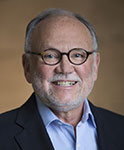 Knowing how to motivate and develop employees effectively can be a challenge for any manager. It’s also one of the keys to organizational success.
Knowing how to motivate and develop employees effectively can be a challenge for any manager. It’s also one of the keys to organizational success.
Don’t miss this informative session with Howard Behar, former President of Starbucks North America and Starbucks Coffee International. Behar will share highlights from his 20 years of inspiring greatness in his Starbucks teams. Read more.
GlobalWA Spring Member Celebration!
 You work every day to make the world a better place. Now it’s time to party!
You work every day to make the world a better place. Now it’s time to party!
We’re celebrating Global Washington’s first five years, and kicking off the next five in style.
Enjoy dinner, drinks and entertainment, mingle with other members, and learn about exciting new things going on at GlobalWA.
And, you just might walk away with one of our fabulous auction items. Read more.
Back to Top
Welcome New Members
Please welcome our newest Global Washington members. Take a moment to familiarize yourself with their work and consider opportunities for support and collaboration!
Advocate Members
Orphans to Ambassadors: Orphans to Ambassadors provides disadvantaged and orphaned children the opportunity to rise out of poverty with sustainable education and practices. The skills, knowledge, and abilities that come from developing their own long-term resource solutions empower children and allow them to become ambassadors of goodwill and sustainability to other children and communities around the world. www.orphanstoambassadors.org
University of Washington School of Law, Graduate Program in Sustainable International Development:
The SID LL.M. program builds upon the groundbreaking work of founder Roy Prosterman who pioneered land reform as a means to secure prosperity for the rural poor. It is the first graduate program at a U.S. law school to focus on international development law. Students learn through an innovative, hands-on, and practical program, designed to provide them with the skills needed to face the international development challenges of the 21st century. http://www.law.washington.edu/sid/
Back to Top
Upcoming Member Events
Various Dates (April-August):
Seattle University School of Theology and Ministry // Introducing the Master of Arts in Transformational Leadership: Information Sessions
April 25:
Upaya Social Ventures // An evening with Shashank: Indian Classical Music Virtuoso
April 27:
Bo M. Karlsson Foundation // Istanbul Night at Bistro Turquaz
April 29:
US Fund for UNICEF // Not My Life Film Screening
May 1:
UW School of Law // Now Accepting Applications for Masters of Law in Sustainable International Development (Deadline May 1, 2014)
May 1:
UW Evans School of Public Affairs // Effective Performance Management
May 1:
Global Visionaries // Deadline for Discount: Global Leadership Summer Institute 2014
May 3:
Global Visionaries // 13th Annual Auction and Dinner
May 3:
Etta Projects // Etta’s Auction 2014
May 4:
Water1st International // CARRY5 Walk for Water
May 7:
UW Evans School of Public Affairs // Government Communicators Forum
May 8:
One By One // Ninth Annual Dinner
May 8:
Big Water Consulting // Maps & Data Workshop for Nonprofits
May 27 – 30, 2014:
Collaborative Impact // Partnership Brokers Training
Back to Top
Career Center
Highlighted Paid Positions
Product Marketing Coordinator – Committee for Children
Regional Communication Coordinator – Oxfam
Highlighted Volunteer Position
Volunteer – Grameen Foundation
Highlighted Internship Positions
Legal and Loan Closing Intern – Global Partnerships
Central Asian Studies Intern – Ayni Education International
For more jobs and resources, visit https://globalwa.org/strengthen/careers-in-development/
Back to Top
GlobalWA Events
April 17:
Networking Happy Hour with Friends of GlobalWA and Humanosphere
May 8:
Executive Director Roundtable
May 13:
New Member Orientation
May 14:
Howard Behar – It’s Not About the Coffee
May 30:
GlobalWA Spring Member Celebration!
Back to Top
Contributors: Dean Forbes, Holly Koch, Gena Lux
Commentary Series, Part I: Measuring Global Goals in the Post-2015 Development Agenda
Posted on April 10, 2014.
By Hien Tran, Director of Global Advocacy, Landesa
This post is part of a series developed by The Chicago Council on Global Affairs and GlobalWA member Landesa to highlight the importance of securing land rights for smallholder farmers. This series is running concurrently with the World Bank’s 2014 Land and Poverty Conference taking place in Washington, DC. Follow the conversation on Twitter with hashtag #landrights.
As discussions continue around the shape of the post-2015 development agenda and how to measure progress towards achieving new global goals, it is useful to step back and consider the story of the drunkard and the streetlight.
The story is that one night, a police officer sees a drunk man searching under a streetlight and he asks what the man has lost. The man responds that he lost his keys and they proceed to search together. After a few minutes, the police officer asks if the man is sure he lost them near the streetlight. The man responds, no, he lost his keys in the park, but he is searching near the streetlight because “that is where the light is.”
In our current dialogue regarding the framework to replace the expiring Millennium Development Goals, we have to guard against this “observational bias” – we need to select goals, targets, and indicators that represent the critical dimensions that must be addressed in the fight against global poverty and inequality, rather than choosing goals, targets or indicators that are less meaningful but can be measured relatively easily.
Although it is often extremely difficult to reliably measure what is truly important—we must and we can do better.
Continue Reading
Commentary Series, Part VII: The Case for Land Rights
By Tim Hanstad, President and CEO of Landesa and Board Member of Global Washington
This post is part of a series developed by The Chicago Council on Global Affairs and GlobalWA member Landesa to highlight the importance of securing land rights for smallholder farmers. This series is running concurrently with the World Bank’s 2014 Land and Poverty Conference taking place in Washington, DC. Follow the conversation on Twitter with hashtag #landrights.
More than one billion of the world’s poorest people share three traits: they live in rural areas, rely on the land to survive, and they lack secure legal rights to the land on which they depend.
Most either toil in other people’s fields for pennies a day or struggle on land which they temporarily control, but insecurely — with the constant threat of displacement.
The coins they earn can never stretch far enough to allow them to buy their own plot, and they have little long-term incentive to improve the plot they currently farm. Often, they can’t send their children to school or obtain other government services, like agricultural credit or inputs, because they are not landowners. As a result, they lack opportunity and are vulnerable to displacement, exploitation, and calls to extremism. Without a fundamental change, their children and grandchildren face a similar future.
Creating a better and safer future for us all depends upon giving these modern-day serfs the opportunity for better life.
Land is at the center of both the problem and the solution.
Continue Reading
Dubai’s Educational Initiatives Praised at the Second Annual Global Education and Skills Forum
Posted on March 31, 2014.
By Gena Lux
Former President Bill Clinton, His Highness Shaikh Mohammad Bin Rashid Al Maktoum, vice-president and prime minister of the United Arab Emirates and Ruler of Dubai, were among senior world officials who attended the Global Education and Skills Forum (GESF) in Dubai on March 15. Shaikh Mohammad personally thanked Clinton for Varkey GEMS Foundation’s significant donation to Dubai Cares to support educational initiatives and programs in developing countries. Clinton is the honorary chairman of Varkey GEMS.
A Gulf News article described the forum events in detail, noting that Clinton expressed praise for Dubai Care’s use of educational opportunities to nearly one million primary school-aged children in economically impoverished countries. Clinton said he admired Shaikh Mohammad’s initiative to modify education to the so-called “smart model,” in addition to creating education outcomes that are equivalent to word-class standards.
Continue Reading
We Day Seattle: Rockin’ the Arena to Celebrate Youth Activism
Posted on March 24, 2014.
By Gena Lux
If you were near the Seattle Center last Friday, you might have felt the collective energy of the 15,000 students and educators packed into Key Arena.
 They screamed at the top of their lungs to break the world record for the loudest We Day ever with help from someone who knows a little something about being loud at a stadium, Seahawks Coach Pete Carroll. Carroll, along with several of his players from the 2014 championship team – Russell Wilson, Derrick Coleman, Bobby Wagner and Jermaine Kearse – and a jaw-dropping lineup of actors, singers, activists and community leaders, participated in Seattle’s 2nd annual We Day, a one-day event culminating Free the Children’s We Act program, a year-long initiative which offers curricular resources, campaigns and materials to help harness the energy and passion of young people and turn it into sustained activism. Microsoft, a valued member of Global Washington, sponsored the day’s activities, and their YouthSpark Reporters talked about how young people can create global change.
They screamed at the top of their lungs to break the world record for the loudest We Day ever with help from someone who knows a little something about being loud at a stadium, Seahawks Coach Pete Carroll. Carroll, along with several of his players from the 2014 championship team – Russell Wilson, Derrick Coleman, Bobby Wagner and Jermaine Kearse – and a jaw-dropping lineup of actors, singers, activists and community leaders, participated in Seattle’s 2nd annual We Day, a one-day event culminating Free the Children’s We Act program, a year-long initiative which offers curricular resources, campaigns and materials to help harness the energy and passion of young people and turn it into sustained activism. Microsoft, a valued member of Global Washington, sponsored the day’s activities, and their YouthSpark Reporters talked about how young people can create global change.
Continue Reading
Nonprofit Communication: Building an Effective Strategy with Limited Resources
Posted on March 17, 2014.
By Sara Atalla
Whether you’re engaging donors, volunteers, members of the media or community leaders, effective communication could be the key to your organization’s success. Ineffective communication, on the other hand, could quickly derail the organization. The latter often holds nonprofits back from the success they deserve.
While organizations of all types and sizes face communication challenges, those with limited resources are typically forced to make tough choices as they prioritize the use of limited budgets and staff time. This is why creating an effective communication strategy and implementing it, despite resource limitations, was the topic of Global Washington’s March Executive Director (ED) Roundtable.
The topic is very relevant to my team at Global Washington. We are only three full-time staff supported by a handful of interns, and we’re constantly challenged as we juggle multiple tasks. Promoting and supporting our members’ work — our #1 priority — can’t be done without consistent, relevant, thoughtful communication. It’s something we think about constantly and strive to continuously improve.
Continue Reading
March 2014 Newsletter
Posted on March 11, 2014.
Welcome to the March 2014 issue of the Global Washington newsletter. If you would like to contact us directly, please email us.
IN THIS ISSUE
Introduction Letter
Members and Friends,
We are excited to announce two very important additions to the Global Washington team.
 Kristen Dailey has joined us as Interim Executive Director. Kristen has over 18 years of experience in international development, including advocacy, issue campaigns, microcredit, and building partnerships among NGOs, businesses and government agencies. Most recently, she served as Chief Operating Officer and Senior Vice President at the Initiative for Global Development, where she played a leadership role in growing the organization from a small Seattle program to an international business alliance. Read more about Kristen and her background.
Kristen Dailey has joined us as Interim Executive Director. Kristen has over 18 years of experience in international development, including advocacy, issue campaigns, microcredit, and building partnerships among NGOs, businesses and government agencies. Most recently, she served as Chief Operating Officer and Senior Vice President at the Initiative for Global Development, where she played a leadership role in growing the organization from a small Seattle program to an international business alliance. Read more about Kristen and her background.
Also, Jeffrey Riedinger has joined the team as a member of our Board of Directors. Jeffrey serves as Vice Provost of Global Affairs at the University of Washington. He oversees the university’s activities in the global arena, including study abroad programs, student and faculty exchange programs, and support services for UW’s research and academic centers abroad. Before joining UW, Jeffrey was Dean of International Studies and Programs at Michigan State University, where he facilitated multidisciplinary research and project collaboration. He also formulated proposals for external funding and strategic partnerships abroad to advance research, teaching and engagement on critical global issues. Read more about Jeffrey and his background.
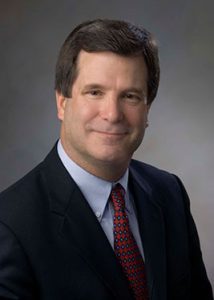 Last week we celebrated International Women’s Day, and we’ve dedicated our March newsletter to the strength and potential of women and girls everywhere. We celebrate those fighting for gender equality, and support them in their efforts to make the world more equal and just.
Last week we celebrated International Women’s Day, and we’ve dedicated our March newsletter to the strength and potential of women and girls everywhere. We celebrate those fighting for gender equality, and support them in their efforts to make the world more equal and just.
I hope you’ll take time to read the stories below, which include several about GlobalWA member organizations that are empowering women and girls and encouraging them to flourish. This is just a snapshot of work being done in Washington State’s global development community. We appreciate the opportunity to serve you and thus be a small part of the work you’re doing to create a better world.
Sincerely,

Bill Clapp, Founder, President of the Board
Global Washington
Back to Top
Women in the News
Why Women and Girls Count: Using Data to Help Build Changemakers
By Holly Koch
What does it look like when three of the country’s most influential women come together to empower women and girls? On Feb. 13, Melinda French Gates, philanthropist and co-founder of the Bill & Melinda Gates Foundation; former U.S. Secretary of State Hillary Clinton; and her daughter Chelsea Clinton, sat down at New York University to launch a new collaboration called “No Ceilings: A Full Participation Project.”
No Ceilings will aggregate hard data to identify gaps in gender equality as a way to target resources and to fuel an international dialogue about why investing in girls is vital to development. Using the Beijing Conference on Women of 1995 as a marker for progress, No Ceilings will measure gains and losses in gender equality to inform future programs.
“The data is very prescriptive,” said Gates. “Data makes a huge difference in terms of where you make investments and where you can see you’re making progress and where you’re not.”
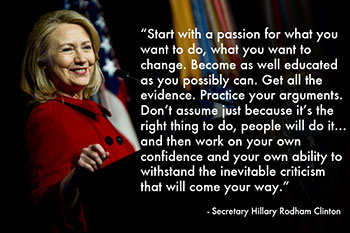 One of the most difficult barriers to cross in obtaining data is knowing where to look. “Women are in the informal economy, which nobody measures,” said Secretary Clinton. Of our responsibility to these women, she said, “We need to be valuing the work women do and we need to be opening doors so that more women are able to participate in the so-called formal economy.”
One of the most difficult barriers to cross in obtaining data is knowing where to look. “Women are in the informal economy, which nobody measures,” said Secretary Clinton. Of our responsibility to these women, she said, “We need to be valuing the work women do and we need to be opening doors so that more women are able to participate in the so-called formal economy.”
Regarding the domestic gender gap, Secretary Clinton and Gates touched on the lost ground the U.S. has seen in the percentages of female graduates in computer science. Gates explained that at the time she graduated with her degree in 1987, women made up 33 percent of graduates; by 2001 the percentage had dropped to 20 percent, and by 2011 the number was even lower at 16 percent.
“Where we lose girls are those critical middle school years, where girls and boys start to lose their self confidence, but girls usually first,” said Gates. Adding to this, Secretary Clinton said, “This is a period when women begin to doubt themselves, when they, unfortunately, develop the perfectionist problem.”
Gates and Secretary Clinton spoke of the importance of women holding up other women, but agreed on the necessary role of men in gender equality. “It takes men using their voices and their positions to both mentor and sponsor women, to then pull them up,” said Gates. On the role of women to be the changemakers in their own lives, Gates advised, “If you’re a changemaker in the world, you’re usually up against something tough – I don’t care what your field is – so, have a base of support back home that you can rely on, that you can try your ideas out on first.”
In what should be an anthem for any woman wanting to empower herself to make a difference, Secretary Clinton urged, “Start with a passion for what you want to do, what you want to change. Become as well educated as you possibly can. Get all the evidence. Practice your arguments. Don’t assume just because it’s the right thing to do people will do it … and then work on your own confidence and your own ability to withstand the inevitable criticism that will come your way.”
To watch the full discussion, click here.
Back to Top
Featured Organization
Ayni Education International
By Holly Koch
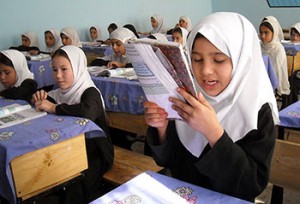 Imagine a school for young girls located in the middle of a war zone. It is a cluster of tents tattered by the extreme shifts in temperature of the harsh climate of Balkh Province in northern Afghanistan. If the girls are lucky, they will have a stone to sit on during class. Now, imagine that the development of their country, which hovers at the bottom of the UN Poverty Index, depends on their education.
Imagine a school for young girls located in the middle of a war zone. It is a cluster of tents tattered by the extreme shifts in temperature of the harsh climate of Balkh Province in northern Afghanistan. If the girls are lucky, they will have a stone to sit on during class. Now, imagine that the development of their country, which hovers at the bottom of the UN Poverty Index, depends on their education.
This is the educational landscape for thousands of girls within which Seattle-based Ayni Education International operates. After Ayni (pronounced “eye-knee”) is invited into an area, a prerequisite for its work, it builds and repairs schools, which include libraries, security walls and guards, latrines and libraries, before handing them over to the Afghan government’s Ministry of Education, to be integrated into the formal education system. Ayni also offers training in their highly competitive computer programs and teacher certification program.
While Ayni has contributed to schools for boys, its focus is on providing the infrastructure, both physical and institutional, for the education of women and girls.
“We’re building upon a statistic,” said Executive Director Ginna Brelsford, “which is, 40 percent of girls in Afghanistan are in school now, which means our work isn’t done. It’s gotten better, but we still need to tackle getting 60 percent more girls in school.” Of Ayni’s pursuit of full participation of girls in school, she said, “Without question, when you educate a girl, you end up educating a whole family,” an important statistic in Afghanistan where families often have upwards of over ten members.
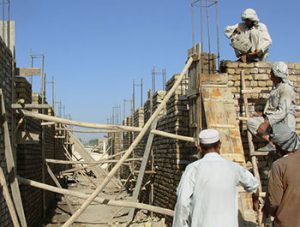 The obstacles to reaching more Balkh girls, while not insurmountable, are formidable. For one, “culturally, after a certain age, girls aren’t allowed to be taught by men,” said Brelsford. This is compounded by the fact that approximately 245 of 412 districts in the province don’t have a woman who is certified to teach. As Brelsford puts it, “If there aren’t enough women who are able to teach, then the fact is, you don’t go to school.”
The obstacles to reaching more Balkh girls, while not insurmountable, are formidable. For one, “culturally, after a certain age, girls aren’t allowed to be taught by men,” said Brelsford. This is compounded by the fact that approximately 245 of 412 districts in the province don’t have a woman who is certified to teach. As Brelsford puts it, “If there aren’t enough women who are able to teach, then the fact is, you don’t go to school.”
To combat this issue, Ayni established a teacher-training certification program wherein women’s education and transportation are sponsored. After the program, “the new teachers tend to go back to their villages,” Brelsford said. “So, it sets up a system where you build into the village structure more and more teachers who are female and who are qualified to provide education to the girls in the village.”
Another obstacle to the education of girls, historically, has been a lack of male leaders’ support. “Without support of fathers, husbands and brothers, it’s hopeless,” Brelsford explained. However, Ayni has begun to see a shift. “What we’ve seen is an increasing number of men who are incredibly supportive of girls’ education.” This support has also been influential on the effects of child marriage, according to Brelsford. “We’ve seen more and more girls who are already married but still coming back to school and working toward graduation, and that’s a different trend.”
Ayni also operates a successful computer training program. With help from the Paul Allen Foundation, National Geographic, and Seattle International Foundation, the program teaches basic Microsoft Office skills and Internet use, which keeps students current with the world’s technological shift, and it sets them apart from other applicants in the job market. A program Ayni originally thought might garner modest interest has seen an explosion of demand. “We could do nothing but build computer programs,” said Brelsford.
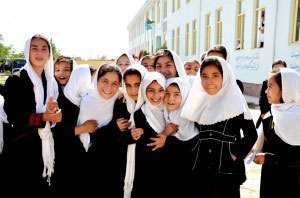 In addition to bolstering the education of girls, the organization is also improving the lives of local workers. Ayni hires and trains local labor to build and renovate the schools, as well as to dig wells for drinking water. “There’s no question that we’re having an impact on the local economy,” said Brelsford.
In addition to bolstering the education of girls, the organization is also improving the lives of local workers. Ayni hires and trains local labor to build and renovate the schools, as well as to dig wells for drinking water. “There’s no question that we’re having an impact on the local economy,” said Brelsford.
In Seattle, Ayni partners with the University of Washington School Of Architecture and the Janet W. Ketcham Foundation to “marry architectural design and sustainable development with international development and poverty eradication,” said Brelsford. The goal is to build a “space for girls to come into a place of beauty while they’re learning. I think that enhances not just their well being, but their ability to absorb the learning material that they’re being given.”
That in itself is going to give women and girls in Afghanistan a fighting chance to reach their potential.
Back to Top
Changemaker
Rita Egrari, Director, Mona Foundation Pacific Northwest Region
By Holly Koch
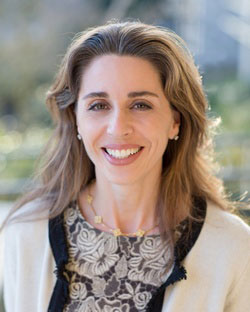 Spend just a little time talking with Rita Egrari and you’ll know you’ve met someone who is doing exactly which she was meant to do. Egrari, director of Mona Foundation’s Pacific Northwest regional office, embodies a dedication to women and girls. While her focus began with an interest in the health of mothers and children, which lead to a B.S. in Nutritional Sciences and a Ph.D. in Public Health, her path was directed to education early on in her career.
Spend just a little time talking with Rita Egrari and you’ll know you’ve met someone who is doing exactly which she was meant to do. Egrari, director of Mona Foundation’s Pacific Northwest regional office, embodies a dedication to women and girls. While her focus began with an interest in the health of mothers and children, which lead to a B.S. in Nutritional Sciences and a Ph.D. in Public Health, her path was directed to education early on in her career.
It was a trip to a small village in Kenya for an internship during her Masters program that would ultimately guide Egrari to her present work. Of the women she met there, she said, “I felt that if they had had the same opportunities as me, they would be so much more than I could ever be, and that really affected me. It became a driving force for me to want to have education for all women, because I could see the lost potential.”
Three children and a doctoral degree later, Egrari attended a party in 2003 where she was introduced to Mona Foundation and its founder, Mahnaz Aflatooni Javid. “We ended up talking the whole night,” she said. Of her reaction to the organization, “I absolutely fell in love with its approach to development.” Two years later, she transitioned from her volunteer position to the Board of Directors. That same year, Egrari’s husband joined Mona’s Board of Advisors. “It’s been really great to partner with him and something that we both love,” she said.
As Egrari described the different projects she has visited as a part of Mona’s yearly site evaluations, there was a theme that emerged of what impacted her most: The joy in the women she met that was created by the opportunity to get an education. “They were happy,” she said.
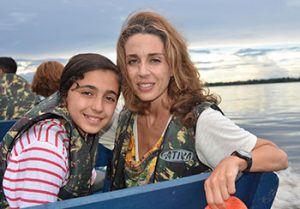 Of the effect education has on students’ self-esteem, she said, “They realize that, ‘Yeah, I might be poor…but I can do something. I can give back,’ and I think that shifts the mindset of people.”
Of the effect education has on students’ self-esteem, she said, “They realize that, ‘Yeah, I might be poor…but I can do something. I can give back,’ and I think that shifts the mindset of people.”
On a trip to Cambodia with her son, she said that, despite the poverty in which the students were living, it was not the state of their clothes or lack of shoes that her son noticed. “What he saw were kids that were so happy getting an education.”
All of Egrari’s children have visited an international Mona Foundation project because she wanted to instill that same sense of agency in her children. “I’m so happy that they experienced that because it’s given them a passion that they can make a difference.”
When asked about her passion for the education of women and girls as the catalyst for change in communities, she said emphatically, “I really am! It’s so real. I mean, I’ve seen it over the last 20 years of being involved in development.” Of getting involved, she said, “I think every one of us has the opportunity to contribute whether we’re doing it professionally or not.”
Egrari urged people to read books such as Half the Sky by Nicholas Kristof and Sheryl WuDunn, and watch movies like Girl Rising, “and get uncomfortable” with the knowledge that women and girls are oppressed in many parts of the world. “Let’s talk about it.”
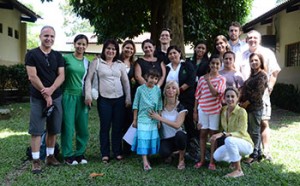 Egrari also serves on the board of Recovery Café. “They work with folks that are afflicted with addiction and homelessness to help them remember that they are worthy and loved for who they are, and that becomes their tool set for overcoming addiction,” she said. Of working with the organization, it’s “something incredibly meaningful to me at a local level.”
Egrari also serves on the board of Recovery Café. “They work with folks that are afflicted with addiction and homelessness to help them remember that they are worthy and loved for who they are, and that becomes their tool set for overcoming addiction,” she said. Of working with the organization, it’s “something incredibly meaningful to me at a local level.”
Of her own goals, “the development of Mona Foundation itself as an agency” and “further examining how I can be of service to my own community” are paramount. “So, while I guess my passion is international, I also believe in being mindful about giving back to my local community too. I certainly love the opportunities that exist in Seattle.”
Back to Top
Girl Rising
Seattle Pacific University Professor Describes Impact on Student
By Holly Koch
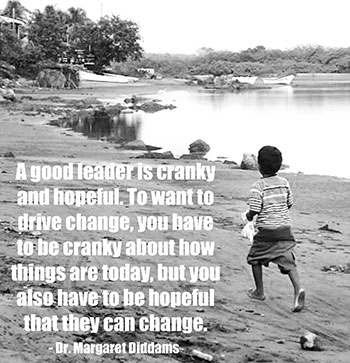 As I walked into the First Free Methodist Church for the screening of Girl Rising, the pews were filled with an audience of mostly young women. Seattle Pacific University’s Professor Dr. Margaret Diddams spoke to the audience about the realities of global injustice and that one of the most important solutions was dedication to international development. Two girls in front of me looked at each other with wide eyes and bright smiles, elbowing each other in a way you might expect to see young girls reacting to a cute boy. These girls, however, were lighting up at the prospect of making the world a better place. I wondered what the nine stories of struggle and courage would inspire them to do.
As I walked into the First Free Methodist Church for the screening of Girl Rising, the pews were filled with an audience of mostly young women. Seattle Pacific University’s Professor Dr. Margaret Diddams spoke to the audience about the realities of global injustice and that one of the most important solutions was dedication to international development. Two girls in front of me looked at each other with wide eyes and bright smiles, elbowing each other in a way you might expect to see young girls reacting to a cute boy. These girls, however, were lighting up at the prospect of making the world a better place. I wondered what the nine stories of struggle and courage would inspire them to do.
To find out, I asked Diddams. “There is a growing concern in America, and in the Free Methodist Church, in particular, with human trafficking,” she began. “I think as people learn more and more about it, they understand that it’s a global issue that’s also in our own backyard.”
Human trafficking and gender inequality benefit greatly from the lack of information and conversation about them. “Watching this film is a place where people can go, ‘I didn’t know,’ and that’s why I’m excited,” said Diddams.
As with any problem, sustainable impact will come not only from addressing the effects, but also from directing attention to the societal causes. “Where I see traction happening is our students are seeing the root causes of trafficking, that those roots go deep, and that if you want to deal with this problem, it’s not just stopping the trafficking,” said Diddams. “It’s building capacity and resources for communities in which this is happening. Education of women is one of them.”
As more people, and students in particular, become aware of social issues in need of advocacy, more of them want to get involved. It is then up to organizations to know what potential volunteers are seeking in an experience. What Diddams has seen is that students “really want to make a difference. They want to see that their life has meaning and that what they do is purposeful.” One problem she says is “Students don’t always know how.” Another issue her students run into is “They don’t always know what the commitment is going to be, and that can be kind of scary.”
To find ways to get involved, Diddams says students are directed to SPU’s Center for Career and Calling, the on-campus SPU Abolitionist Club, and to the opportunities available at GlobalWA. Of the final resource, she said, “The goals of GlobalWA are totally aligned with what we want to do with education as a transformational experience.”
A final recommendation Diddams left with students on how to effect change was this: “A good leader is cranky and hopeful. To want to drive change, you have to be cranky about how things are today, but you also have to be hopeful that they can change.”
Click here to see available volunteer opportunities with GlobalWA member organizations.
Back to Top
Seattle International Foundation Announces Call for Applications for 2014 Global Program
The Seattle International Foundation (SIF) is accepting applications for the 2014 Global Program beginning March 24, 2014. The Global Program supports local organizations based in Washington state that are working internationally. SIF is interested in development projects in all regions of the world. The Global Program is open to 501(c)3 organizations, or those with fiscal sponsorship, with an annual organizational or project budget of less than $2 million (USD). The deadline to apply is April 27, 2014. For more information, please visit: www.seaif.org.
Back to Top
Welcome New Members
Please welcome our newest Global Washington members. Take a moment to familiarize yourself with their work and consider opportunities for support and collaboration!
Advocate Members
The Krista Foundation: Provides mentoring support and Service and Leadership Development Grants for young adults engaged in voluntary or vocational service as an expression of their Christian faith. Seeks to encourage a new generation of leaders to develop a lifelong ethic of service, civic engagement and global understanding. The Krista Foundation honors the life and vision of Krista Kimberly Hunt Ausland, who was killed at age 25 while volunteering with her husband, Aaron, in global service in rural Bolivia. Inspired by Krista’s desire “to show God’s love in actions,” her family and friends wanted an enduring legacy to celebrate her spirit of active love and faith. http://www.kristafoundation.org/
Third Sector Company: Founded in 2002 by nonprofit professionals to benefit their peers, The Third Sector Company, Inc. is a highly specialized professional services organization deeply committed to and driven by a mission statement that values human capital development as fundamental to an organization’s success. http://thirdsectorcompany.com/
Back to Top
Upcoming Member Events
March 11, 2014:
World Affairs Council // The Magic of Turkey
March 12, 2014:
Henry M. Jackson School of International Studies //A Taste of Life in Israel Film Screening
March 12, 2014:
Washington Clean Technology Alliance // Controversy Over Coal Terminals: Should the Northwest Export Coal?
March 13, 2014:
Shoreline Community College // Project Education Kenya: Transferring Lives through Education
March 13, 2014:
Seattle University, MA in Transformational Leadership // Information Session
March 18, 2014:
Habitat for Humanity // Annual Benefit Luncheon
March 19, 2014:
Woodland Park Zoo // Thrive
March 21, 2014:
Landesa // Annual Seed the Change Luncheon
March 23-28, 2014:
Evans School of Public Affairs, UW // Nonprofit Executive Leadership Institute
March 24, 2014:
Engineers Without Borders // Monthly Project Committee Meeting
March 24, 2014:
IDRI // World TB Day Event
March 25, 2014:
Trade Development Alliance // International Hot Topic Series Presents: 2014 Business Outlook for Mexico
March 25, 27, and April 1, 2014:
NPH USA // Faces of Hope – NW region
March 27, 2014:
World Trade Center Seattle // Next Generation Sustainability: Cutting Edge Practices for Small Business
April 4, 2014:
Trade Development Alliance // Trade Alliance Coffee Break: Opportunities with Australia
April 5, 2014:
Bill & Melinda Gates Foundation Visitor Center // Family Day: Food for Good
Back to Top
Conferences & Trainings
March 12, 2014:
Essentials of Grantwriting
March 13, 2014:
How to Build a Successful Volunteer Program: Essential Considerations Not to Be Overlooked
March 20, 2014:
Leadership from Within
March 26-28, 2014:
GLOBE2014
March 28-30, 2014:
Human Rights Watch Film Festival at SIFF Film Center
April 1, 2014:
Registration opens for the 2014 Independent Sector National Conference in Seattle
April 3, 2014:
Nonprofit Board Membership 101
April 4-6, 2014:
Western Regional International Health Conference
April 12, 2014:
11th Annual Global Health & Innovation Conference
Back to Top
Career Center
Highlighted Paid Positions
Fund Development Coordinator – Etta Projects
Grants & Compliance Manager – Splash
Youth Programs Specialist – Woodland Park Zoo
Highlighted Volunteer Position
New Chapter Opportunity – Healing the Children
Highlighted Internship Positions
Communications and PR Intern – Global Visionaries
Graduate Level Internship, Stunting, MCHIP – PATH
For more jobs and resources, visit https://globalwa.org/strengthen/careers-in-development/
Back to Top
GlobalWA Events
March 12:
New Member Orientation
March 13:
Executive Director Roundtable
March 20:
Networking Happy Hour with Friends of GlobalWA, WGHA & Humanosphere
May 14:
Howard Behar – It’s Not About the Coffee
Back to Top
Contributors: Holly Koch
And the 2014 Global Social Entrepreneurship Competition Winners Are . . .
By Gena Lux
Thursday, Feb. 27 – the day most Global Social Entrepreneurship Competition (GSEC) teams were nervously anticipating – had finally arrived. After four days of coaching, judging and presenting, the competition prize winners were announced during the University of Washington’s GSEC Award Banquet at the Grand Hyatt Seattle.
This year’s competition was the 10th annual GSEC, hosted by the Global Business Center at the UW Michael G. Foster School of Business. The GSEC provides student teams from around the world with a platform to present their business plans to a panel of judges as well as to the public, compete for prizes, and most importantly, raise awareness about some brilliant initiatives that can provide solutions to some important global problems.
Continue Reading

 “Who else can bring together NGOs, companies, philanthropists, and universities to have meaningful conversations about development?”
“Who else can bring together NGOs, companies, philanthropists, and universities to have meaningful conversations about development?”

 April 1 marked the official beginning of a first-of-its-kind component of India’s update to its 1956
April 1 marked the official beginning of a first-of-its-kind component of India’s update to its 1956 

 To ensure the continued quality of water to both the affected communities and to donors, in-country staff go to these sites every three months for the first two years, and every six months thereafter, according to Stowe. Reports on the projects they conduct are published on Splash’s online system for accountability,
To ensure the continued quality of water to both the affected communities and to donors, in-country staff go to these sites every three months for the first two years, and every six months thereafter, according to Stowe. Reports on the projects they conduct are published on Splash’s online system for accountability,  “In India, the goal is to recalibrate what the national quality standard is, and to eventually leverage Splash’s work in India as the model,” said Stowe. Splash has identified that the amount of funding by the Indian government toward similar projects is comparable to the needs of establishing the organization’s model at scale, an extremely promising fact.
“In India, the goal is to recalibrate what the national quality standard is, and to eventually leverage Splash’s work in India as the model,” said Stowe. Splash has identified that the amount of funding by the Indian government toward similar projects is comparable to the needs of establishing the organization’s model at scale, an extremely promising fact. It’s an oft-heard story: A young couple emigrates from India to the United States with aspirations of higher education and a better future for their children.
It’s an oft-heard story: A young couple emigrates from India to the United States with aspirations of higher education and a better future for their children. Shenoy speaks with fervor about Upaya’s entrepreneurs and proudly displays the finished products from one of their ventures: dishware made out of dried leaves that come from areca palm trees, found in abundance in the state of Assam in northeast India. Upaya’s financial and technical support helped a local Assamese entrepreneur build a number of production units, complete with machines that produce leaf plates in different shapes and sizes. These small factories have created hundreds of jobs for the ultra poor in the state of Assam.
Shenoy speaks with fervor about Upaya’s entrepreneurs and proudly displays the finished products from one of their ventures: dishware made out of dried leaves that come from areca palm trees, found in abundance in the state of Assam in northeast India. Upaya’s financial and technical support helped a local Assamese entrepreneur build a number of production units, complete with machines that produce leaf plates in different shapes and sizes. These small factories have created hundreds of jobs for the ultra poor in the state of Assam. Global Washington member Prosthetics Outreach Foundation celebrated 25 years of life-changing work – giving the gift of mobility in the developing world – at its March gala, and it used the occasion to announce the organization’s new name:
Global Washington member Prosthetics Outreach Foundation celebrated 25 years of life-changing work – giving the gift of mobility in the developing world – at its March gala, and it used the occasion to announce the organization’s new name:  As a U.S. Army surgeon during World War II, MOi founder Dr. Ernest M. Burgess witnessed the devastating effects amputees face due to immobility. A prominent Seattle-based orthopedic surgeon, Dr. Burgess began the organization as a way to improve lives, as well as U.S.-Vietnam relations. In addition to providing physical rehabilitation services and orthopedic surgery outreach, more recently, MOi has grown to include a substantial clubfoot program, addressing a debilitating deformity annually afflicting one in 1,000 newborns. “It is life-changing,” said McGowan. “When you help that one individual regain their mobility, it creates a ripple effect that helps the family and the community.”
As a U.S. Army surgeon during World War II, MOi founder Dr. Ernest M. Burgess witnessed the devastating effects amputees face due to immobility. A prominent Seattle-based orthopedic surgeon, Dr. Burgess began the organization as a way to improve lives, as well as U.S.-Vietnam relations. In addition to providing physical rehabilitation services and orthopedic surgery outreach, more recently, MOi has grown to include a substantial clubfoot program, addressing a debilitating deformity annually afflicting one in 1,000 newborns. “It is life-changing,” said McGowan. “When you help that one individual regain their mobility, it creates a ripple effect that helps the family and the community.” Knowing how to motivate and develop employees effectively can be a challenge for any manager. It’s also one of the keys to organizational success.
Knowing how to motivate and develop employees effectively can be a challenge for any manager. It’s also one of the keys to organizational success. You work every day to make the world a better place. Now it’s time to party!
You work every day to make the world a better place. Now it’s time to party! They screamed at the top of their lungs to break the world record for the loudest
They screamed at the top of their lungs to break the world record for the loudest  Last week we celebrated International Women’s Day, and we’ve dedicated our March newsletter to the strength and potential of women and girls everywhere. We celebrate those fighting for gender equality, and support them in their efforts to make the world more equal and just.
Last week we celebrated International Women’s Day, and we’ve dedicated our March newsletter to the strength and potential of women and girls everywhere. We celebrate those fighting for gender equality, and support them in their efforts to make the world more equal and just.
 One of the most difficult barriers to cross in obtaining data is knowing where to look. “Women are in the informal economy, which nobody measures,” said Secretary Clinton. Of our responsibility to these women, she said, “We need to be valuing the work women do and we need to be opening doors so that more women are able to participate in the so-called formal economy.”
One of the most difficult barriers to cross in obtaining data is knowing where to look. “Women are in the informal economy, which nobody measures,” said Secretary Clinton. Of our responsibility to these women, she said, “We need to be valuing the work women do and we need to be opening doors so that more women are able to participate in the so-called formal economy.” Imagine a school for young girls located in the middle of a war zone. It is a cluster of tents tattered by the extreme shifts in temperature of the harsh climate of Balkh Province in northern Afghanistan. If the girls are lucky, they will have a stone to sit on during class. Now, imagine that the development of their country, which hovers at the bottom of the UN Poverty Index, depends on their education.
Imagine a school for young girls located in the middle of a war zone. It is a cluster of tents tattered by the extreme shifts in temperature of the harsh climate of Balkh Province in northern Afghanistan. If the girls are lucky, they will have a stone to sit on during class. Now, imagine that the development of their country, which hovers at the bottom of the UN Poverty Index, depends on their education. The obstacles to reaching more Balkh girls, while not insurmountable, are formidable. For one, “culturally, after a certain age, girls aren’t allowed to be taught by men,” said Brelsford. This is compounded by the fact that approximately 245 of 412 districts in the province don’t have a woman who is certified to teach. As Brelsford puts it, “If there aren’t enough women who are able to teach, then the fact is, you don’t go to school.”
The obstacles to reaching more Balkh girls, while not insurmountable, are formidable. For one, “culturally, after a certain age, girls aren’t allowed to be taught by men,” said Brelsford. This is compounded by the fact that approximately 245 of 412 districts in the province don’t have a woman who is certified to teach. As Brelsford puts it, “If there aren’t enough women who are able to teach, then the fact is, you don’t go to school.” In addition to bolstering the education of girls, the organization is also improving the lives of local workers. Ayni hires and trains local labor to build and renovate the schools, as well as to dig wells for drinking water. “There’s no question that we’re having an impact on the local economy,” said Brelsford.
In addition to bolstering the education of girls, the organization is also improving the lives of local workers. Ayni hires and trains local labor to build and renovate the schools, as well as to dig wells for drinking water. “There’s no question that we’re having an impact on the local economy,” said Brelsford. Spend just a little time talking with Rita Egrari and you’ll know you’ve met someone who is doing exactly which she was meant to do. Egrari, director of
Spend just a little time talking with Rita Egrari and you’ll know you’ve met someone who is doing exactly which she was meant to do. Egrari, director of  Of the effect education has on students’ self-esteem, she said, “They realize that, ‘Yeah, I might be poor…but I can do something. I can give back,’ and I think that shifts the mindset of people.”
Of the effect education has on students’ self-esteem, she said, “They realize that, ‘Yeah, I might be poor…but I can do something. I can give back,’ and I think that shifts the mindset of people.” Egrari also serves on the board of
Egrari also serves on the board of  As I walked into the First Free Methodist Church for the screening of
As I walked into the First Free Methodist Church for the screening of